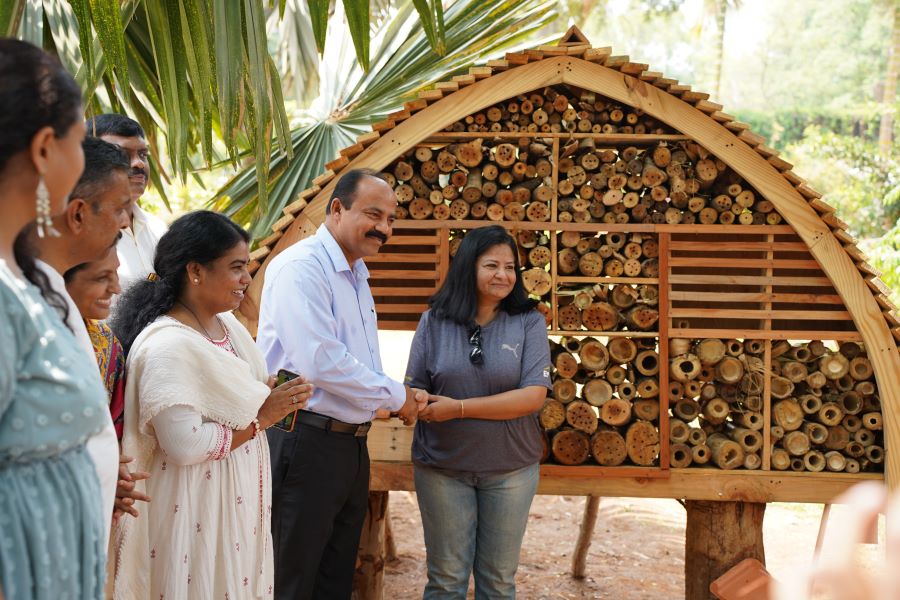Bengaluru, April 20, 2024: EY Global Delivery Services (GDS) has collaborated with Bhumi, supported by Vibhinna India Foundation, to jointly build 21 ‘Insect Cafes’ at prominent botanical gardens across Bengaluru in an effort to promote insect conservation and the overall ecosystem.
The project will culminate with the completion of a total of 21 insect cafes across the city.
The Insect Café project involves a total of three events, beginning with the launch of seven cafes on March 22 at Doddasaagare Botanical Garden. This is being followed by similar endeavours – in Lalbagh Botanical Gardens on April 19, and in Cubbon Park in June, with eight and seven cafes to be assembled at each location respectively.
The Insect Café launch event at Lalbagh Botanical Garden was attended by D S Ramesh, Director, Department of Horticulture, Govt of Karnataka; Dr M Jagadeesh, Joint Director, Parks and Gardens; and G Kusuma, Deputy Director, Lalbagh Botanical Garden. Over 300 dedicated EY GDS volunteers contributed their time and effort till date toward the initiative, with another 150 volunteers expected to join the event in Cubbon Park in June.
D S Ramesh at the launch event said, “The launch of the Insect Café is a great initiative by EY GDS and its partners. This marks a crucial step toward protecting and nurturing our indispensable species of insects. Left without their safe habitats to support, reproduce and thrive, many insects are nearing extinction, and this could significantly endanger the food chain. Apart from familiarizing the public with the importance of preserving insect life, I hope these insect cafes will encourage the general public to have such habitats in their backyards.”
Insect cafes are eco-friendly structures made of upcycled wood, mud, and bamboo; these strategically placed frameworks offer safe nesting grounds for a variety of insect species. With urban expansion and intensive agricultural practices posing significant threats to insect populations, particularly vital pollinators like bees, it has disrupted the delicate balance of the food chain and jeopardized insect food security. Insect cafes will help in insect pollination and in maintaining a balanced food chain, thereby promoting biodiversity and contributing to a sustainable planet.
Manesh Patel, Chief Operating Officer, EY GDS, said, "In the realm of sustainability, EY GDS remains steadfast in our commitment to reducing our ecological footprint. Our initiative to support Insect Cafe is a testament to our innovative approach, embodying our dedication to promote biodiversity and ecological balance in urban spaces. I would like to thank Bhumi and Vibhinna India Foundation for collaborating with EY GDS on this initiative."
The Insect Café project not only serves as a conservation effort but also empowers local communities. By sourcing upcycled wood from rural households, the project drives waste reduction and sustainable practices, while generating income for the community. Crafted with durable trees such as acacia, jaali and eucalyptus, these eco-friendly habitats require minimal maintenance. Additionally, 50% of the cost of the cafés directly supports women farmers involved in wood collection, fostering sustainable livelihoods.
Rumi Mallick Mitra, Director of Corporate Responsibility at EY GDS, said, “At EY GDS, we always look to empower marginalized communities as well as protect the environment through education, skill development, and conservation projects. By setting up these eco-friendly habitats, we are preserving biodiversity and promoting sustainable ecosystems. We are proud of our partnership with Bhumi and Vibhinna India Foundation and are committed to fostering environmental responsibility for a sustainable future.”
"The Insect Café initiative showcases our commitment to biodiversity conservation and sustainable ecosystem management," said David Kumar, Founder of Vibhinna India Foundation. "By providing these safe habitats, we not only support pollination and food security for insects but also contribute to the overall health of our planet."
Following the construction of the insect cafes, a research study by entomologists and students in collaboration with College of Horticulture, Mysore, will monitor the cafes' impact on insect populations, with the findings expected to be published in a year.




















.jpg)



